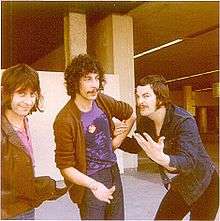Ashton, Gardner and Dyke
Ashton, Gardner and Dyke were a British rock trio, most popular in the early 1970s. They are best remembered for their song, "Resurrection Shuffle", a transatlantic Top 40 success in 1971. However, this success finally left them known as one-hit wonders.
Ashton, Gardner and Dyke | |
|---|---|
 (l-r): Kim Gardner, Mick Liber, Tony Ashton | |
| Background information | |
| Origin | London, England |
| Genres | Rock, jazz-rock, blues-rock |
| Years active | 1968–1972[1] |
| Labels | Polydor, Capitol |
| Associated acts | The Remo Four The Creation |
| Members | Tony Ashton Kim Gardner Roy Dyke Mick Liber |
History
Founding band member, Tony Ashton first met the drummer Roy Dyke, when playing with various Blackpool based groups.
Ashton was invited to join the Liverpool beat group, The Remo Four as organist/vocalist, whilst Roy Dyke became the group's drummer, having joined them in 1963. Their best work came in 1966 when they released their album Smile! Before their break-up in 1968, they backed George Harrison on his album Wonderwall Music. Harrison later played guitar on their song "I'm Your Spiritual Breadman".[2]
Ashton and Dyke then joined forces in 1968 with the bass guitar playing Kim Gardner,[1] who had previously played in minor British groups, The Birds and The Creation. The triad simply called themselves Ashton, Gardner and Dyke. Mick Liber formerly of Python Lee Jackson played lead guitar with the group.[3]
They released their first single "Maiden Voyage"/"See The Sun In My Eyes" on Polydor Records in 1969, but it flopped. However, their next single, "Resurrection Shuffle" on Capitol Records, made them household names. The brass section was Lyle Jenkins and Dave Caswell of the Birmingham band Galliard. The song entered the UK Singles Chart on 16 January 1971, had a chart life of 14 weeks, and peaked at Number 3.[4] The song reached number 40 in the U.S. Billboard Hot 100 chart.[5] The song was their only hit record, earning them the designation of one-hit wonders. The song has since been covered by a number of artists, including Tom Jones and Clarence Clemons.
Their follow-up single "Can You Get It" lacked the general boisterous appeal of "Resurrection Shuffle", and failed to chart. Nevertheless, Ashton Gardner and Dyke persevered and recorded three albums (see discography below). The trio also backed Irish singer Jonathan Kelly on his 1970 debut album. And the following year, they appeared, together with other British jazz and rock musicians, on Leigh Stephens' Cast of Thousands (1971).[6]
Also in the band for a period of time and on the cover of their "Best Of" cd was ex-Bee Gees guitarist Vince Melouney.
Their last recording together was a collaboration with Jon Lord on the soundtrack for a B movie, The Last Rebel, starring former gridiron star, Joe Namath. Ashton also appeared on Lord's first solo album Gemini Suite in 1972. The trio finally split the same year.[1]
Afterwards
After the band's demise, Tony Ashton went on to play for Medicine Head, and was briefly in Family before teaming up again with Deep Purple's Jon Lord in Ashton & Lord. Later still he appeared with Lord and Purple's drummer Ian Paice as Paice Ashton Lord. Dyke and then Gardner joined Badger.
Ashton died of cancer, on 28 May 2001.[7] Gardner also died of cancer on 24 October 2001, in Los Angeles, California, aged 53.
Discography
Studio albums
Soundtracks
|
Live albums
Singles
|
Band members
- Tony Ashton — (born Edward Anthony Ashton, 1 March 1946, Blackburn;[10] died 28 May 2001[7]) — keyboardist and vocalist
- Kim Gardner — (born 27 January 1948,[11] Dulwich, London; died 24 October 2001) — bassist
- Roy Dyke — (born 13 February 1945,[12] Liverpool) — drummer
- Mick Liber — (born 1 March 1944, Peebles, Scotland) — lead guitarist.
References
- Dave Thompson. "Ashton, Gardner & Dyke | Biography". AllMusic. Retrieved 25 January 2014.
- Castleman, Harry; Podrazik, Walter J. (1977). "1970 – And God Had Indigestion". All Together Now – The First Complete Beatles Discography 1961–1975 (Second ed.). New York: Ballantine Books. p. 92. ISBN 0-345-25680-8.
- Hill, Robin E. (1 April 2012). "It Ain't Rock & Roll: The biography of drummer John Kerrison". Lulu.com. Retrieved 15 January 2019 – via Google Books.
- Roberts, David (2006). British Hit Singles & Albums (19th ed.). London: Guinness World Records Limited. p. 31. ISBN 1-904994-10-5.
- Gillett, Charlie & Frith, Simon (1975). Rock File 3 Chartlog - Sources of British Hit Songs:Writers, American Hits and Original Versions. St. Albans, Herts.: Panther. p. 168. ISBN 0-586-04261-X.
- "Cast of Thousands - Leigh Stephens | Credits". AllMusic. Retrieved 25 January 2014.
- Doc Rock. "The Dead Rock Stars Club 2001". Thedeadrockstarsclub.com. Retrieved 25 January 2014.
- "Ashton, Gardner & Dyke | Discography". AllMusic. 1 May 2001. Retrieved 25 January 2014.
- "Ashton, Gardner & Dyke Discography". Discogs.com. Retrieved 4 October 2015.
- William Ruhlmann. "Tony Ashton | Biography". AllMusic. Retrieved 25 January 2014.
- "Kim Gardner". The Telegraph. 15 November 2001. Retrieved 30 December 2017.
- "Roy Dyke | Credits". AllMusic. 13 February 1945. Retrieved 25 January 2014.